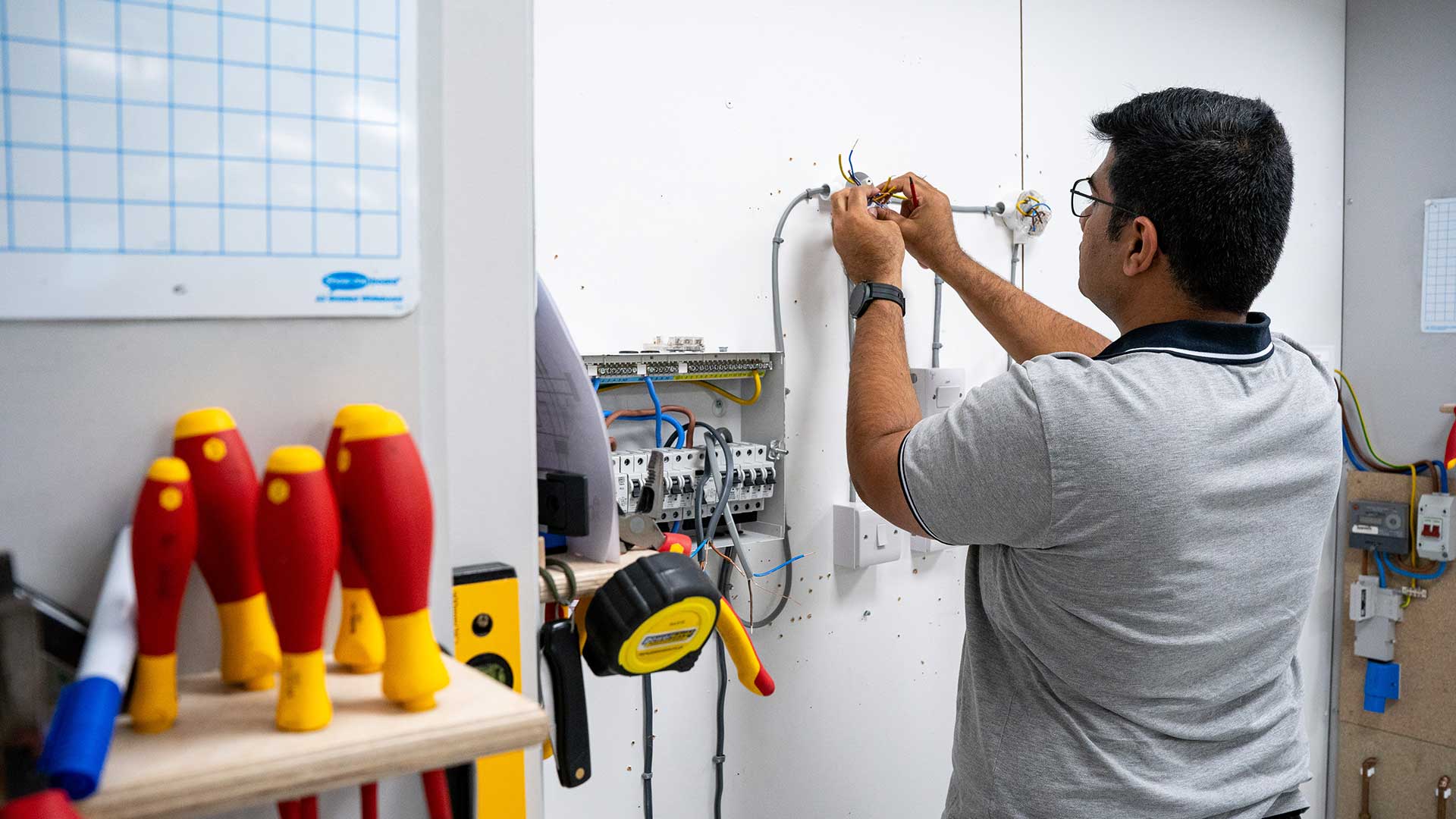Electricians are integral to our modern lives, ensuring that homes, businesses, and infrastructure are powered and safe. If you’re considering a career as an electrician or looking to understand the financial potential of this trade, this comprehensive guide will provide you with valuable insights into electrician salaries in the UK.
What is the Average Salary for an Electrician?
Electrician salaries can vary significantly based on factors such as experience, location, and specialisation. The average salary for an electrician in the UK is approximately £33,500 per year. This average takes into account both newly qualified electricians and those with more experience.
Entry-level electricians can expect to earn between £18,000 and £22,000 per year, while those with several years of experience can see their earnings rise significantly.
What is a Master Electrician’s Salary?
A master electrician, who typically has the highest level of expertise and experience, can command a higher salary. In the UK, a master electrician can earn between £40,000 and £60,000 per year, depending on the region and the complexity of the projects they undertake.
Starting Salary for an Electrician
Newly qualified electricians can expect to start with a salary ranging from £18,000 to £22,000 per year. This starting salary can increase with experience, additional qualifications, and specialisations.
Electrician Salary Based on Specialisation
Specialising in specific areas of electrical work can significantly impact an electrician’s salary. Here are a few examples of how specialisation can affect earnings:
- Renewable Energy: Electricians who upskill into renewable energy technologies, such as solar power, electric vehicle (EV) charging, and battery storage, can earn an additional £12,000 to £15,000 per year. This reflects the growing demand for renewable energy solutions and the specialised knowledge required.
- Industrial Electricians: Those working in industrial settings often earn more due to the complexity and scale of the projects. Industrial electricians can earn between £35,000 and £45,000 per year.
- Commercial Electricians: Electricians who focus on commercial projects, such as office buildings and retail spaces, typically earn between £30,000 and £40,000 per year.
Regional Variations in Electrician Salaries
Electrician salaries can vary based on geographic location. In general, electricians in London and the South East of England tend to earn higher salaries compared to those in other regions. Here’s a breakdown of average salaries by region:
- London: £35,000 – £40,000 per year
- South East: £33,000 – £38,000 per year
- Midlands: £30,000 – £35,000 per year
- North West: £28,000 – £33,000 per year
- Scotland: £30,000 – £35,000 per year
- Wales: £28,000 – £33,000 per year
Electricians’ Rates: A Quick Guide
Electricians typically charge for their work in one of three ways:
- Fixed Fee per Job: Many electricians prefer to provide a fixed fee for specific jobs. This can offer transparency and predictability for both the electrician and the client.
- Hourly Rate: The average hourly rate for an electrician in the UK is around £40 per hour. This can vary based on factors such as location and the complexity of the work.
- Day Rate: For jobs that are expected to take a full day or more, electricians often charge a day rate. The industry-accepted average day rate for an electrician is between £200 and £250.
Electricians’ Emergency Hourly Rate
In emergency situations, electricians typically charge a higher hourly rate. The standard emergency hourly rate ranges between £80 and £100 per hour. This higher rate reflects the urgency and often the unsociable hours involved in emergency work.
Pricing on the Job (POA)
While hourly and day rates provide a good benchmark, many electricians prefer to price each job individually. This approach takes into account various factors, including:
- Material Costs: The cost of materials required for the job.
- Labour Costs: Any additional labourers needed to complete the job.
- Travel Expenses: Fuel costs and travel time to the job site.
- Duration: The expected time required to complete the job.
- Location: Differences in pricing based on geographic location.
- Nature of the Job: Whether the job is routine maintenance or an emergency repair.
Additional Factors Influencing Electrician Salaries
Several additional factors can influence an electrician’s salary:
- Experience: More experienced electricians tend to command higher salaries.
- Qualifications: Advanced qualifications and certifications can lead to higher pay.
- Specialisations: Focusing on high-demand areas like renewable energy can increase earnings.
- Work Environment: Electricians working in hazardous or challenging environments may earn more.
Electricians’ Earnings: Subcontracting vs. Working Directly
Electricians often work in two main ways: sub-contracting or working directly for clients. Each has its own set of advantages and considerations.
- Sub-Contracting: Subcontracting can provide steady work and help build experience. Sub-contractors typically earn between £130 and £150 per day. However, this rate may not include additional costs such as materials and travel.
- Working Directly for Clients: Electricians who work directly for clients can often charge higher rates, typically between £200 and £250 per day. This approach allows for greater control over pricing but requires managing additional business costs.
Electricians’ Pricing Recommendations
Pricing electrical work can be challenging, especially for newly qualified electricians. Here are some resources to help with pricing:
- MyBuilder Pricing Guide for Electricians
- Electricians Price List by Tradesmencosts.co.uk
- Electrician Hourly Rate Guide by Checkatrade
- Cost Guide: Electrician by TrustedTraders
- Electricians Price List for 2021 by Household Quotes
These guides provide valuable insights into average costs for various electrical jobs, helping electricians price their services competitively.
Common Electrical Jobs and Their Average Costs
Here are some common electrical jobs and their average costs:
- PAT Testing: £1 to £2 per electrical appliance tested
- Full Domestic Rewire: £2,500 for a 2-bedroom mid-terrace house to £5,000-7,000 for a 4-bedroom detached house
- Smoke Alarm Installation: £80-130
- Carbon Monoxide Alarm Installation: £80-130
- Electric Underfloor Heating Installation: £50-80 per square metre
Conclusion
Electricians play a crucial role in ensuring the safety and functionality of electrical systems in homes, businesses, and industrial settings. Understanding the potential earnings in this profession can help aspiring electricians make informed decisions about their careers.
The salary of an electrician in the UK varies based on experience, location, and specialisation. Entry-level electricians can expect to earn between £18,000 and £22,000 per year, while experienced electricians can earn £33,500 or more. Specialising in areas like renewable energy can further increase earnings.
Electricians have various ways to charge for their work, including fixed fees, hourly rates, and day rates. The average hourly rate is around £40, while the average day rate ranges between £200 and £250. Emergency rates are higher, typically between £80 and £100 per hour.
Whether working as a sub-contractor or directly for clients, electricians can find lucrative opportunities in the UK. By understanding the factors that influence salaries and pricing their services competitively, electricians can achieve financial success and job satisfaction in this essential trade.
For more information, further training, resources and insights, reach out to us at City & Guilds Training – Electrical – we can help you take your electrician career to the next level!



























